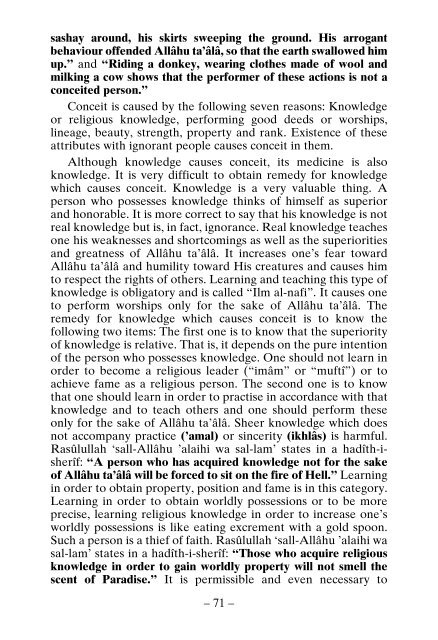Ethics of Islam
Ethics of Islam is taken from the book Berîka by Muhammad Hâdimi. Immorality and ways to get rid of it; 40 depravities and cures to them; usefulness of ethics; what is a soul; strengths of a soul; Personalities emanating from wisdom, courage, chastity and justice are extensively explained.
Ethics of Islam is taken from the book Berîka by Muhammad Hâdimi. Immorality and ways to get rid of it; 40 depravities and cures to them; usefulness of ethics; what is a soul; strengths of a soul; Personalities emanating from wisdom, courage, chastity and justice are extensively explained.
Create successful ePaper yourself
Turn your PDF publications into a flip-book with our unique Google optimized e-Paper software.
sashay around, his skirts sweeping the ground. His arrogant<br />
behaviour <strong>of</strong>fended Allâhu ta’âlâ, so that the earth swallowed him<br />
up.” and “Riding a donkey, wearing clothes made <strong>of</strong> wool and<br />
milking a cow shows that the performer <strong>of</strong> these actions is not a<br />
conceited person.”<br />
Conceit is caused by the following seven reasons: Knowledge<br />
or religious knowledge, performing good deeds or worships,<br />
lineage, beauty, strength, property and rank. Existence <strong>of</strong> these<br />
attributes with ignorant people causes conceit in them.<br />
Although knowledge causes conceit, its medicine is also<br />
knowledge. It is very difficult to obtain remedy for knowledge<br />
which causes conceit. Knowledge is a very valuable thing. A<br />
person who possesses knowledge thinks <strong>of</strong> himself as superior<br />
and honorable. It is more correct to say that his knowledge is not<br />
real knowledge but is, in fact, ignorance. Real knowledge teaches<br />
one his weaknesses and shortcomings as well as the superiorities<br />
and greatness <strong>of</strong> Allâhu ta’âlâ. It increases one’s fear toward<br />
Allâhu ta’âlâ and humility toward His creatures and causes him<br />
to respect the rights <strong>of</strong> others. Learning and teaching this type <strong>of</strong><br />
knowledge is obligatory and is called “Ilm al-nafi”. It causes one<br />
to perform worships only for the sake <strong>of</strong> Allâhu ta’âlâ. The<br />
remedy for knowledge which causes conceit is to know the<br />
following two items: The first one is to know that the superiority<br />
<strong>of</strong> knowledge is relative. That is, it depends on the pure intention<br />
<strong>of</strong> the person who possesses knowledge. One should not learn in<br />
order to become a religious leader (“imâm” or “muftî”) or to<br />
achieve fame as a religious person. The second one is to know<br />
that one should learn in order to practise in accordance with that<br />
knowledge and to teach others and one should perform these<br />
only for the sake <strong>of</strong> Allâhu ta’âlâ. Sheer knowledge which does<br />
not accompany practice (’amal) or sincerity (ikhlâs) is harmful.<br />
Rasûlullah ‘sall-Allâhu ’alaihi wa sal-lam’ states in a hadîth-isherîf:<br />
“A person who has acquired knowledge not for the sake<br />
<strong>of</strong> Allâhu ta’âlâ will be forced to sit on the fire <strong>of</strong> Hell.” Learning<br />
in order to obtain property, position and fame is in this category.<br />
Learning in order to obtain worldly possessions or to be more<br />
precise, learning religious knowledge in order to increase one’s<br />
worldly possessions is like eating excrement with a gold spoon.<br />
Such a person is a thief <strong>of</strong> faith. Rasûlullah ‘sall-Allâhu ’alaihi wa<br />
sal-lam’ states in a hadîth-i-sherîf: “Those who acquire religious<br />
knowledge in order to gain worldly property will not smell the<br />
scent <strong>of</strong> Paradise.” It is permissible and even necessary to<br />
– 71 –

















